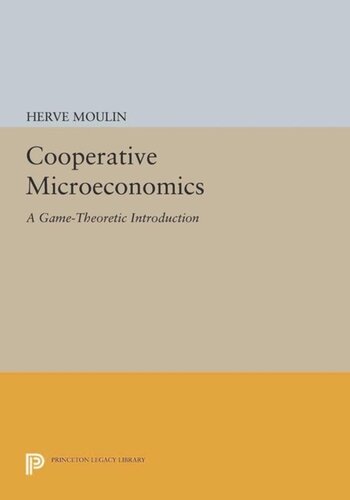

Most ebook files are in PDF format, so you can easily read them using various software such as Foxit Reader or directly on the Google Chrome browser.
Some ebook files are released by publishers in other formats such as .awz, .mobi, .epub, .fb2, etc. You may need to install specific software to read these formats on mobile/PC, such as Calibre.
Please read the tutorial at this link: https://ebookbell.com/faq
We offer FREE conversion to the popular formats you request; however, this may take some time. Therefore, right after payment, please email us, and we will try to provide the service as quickly as possible.
For some exceptional file formats or broken links (if any), please refrain from opening any disputes. Instead, email us first, and we will try to assist within a maximum of 6 hours.
EbookBell Team

0.0
0 reviewsOver the past fifty years game theory has had a major impact on the field of economics. It was for work in game theory that the 1994 Nobel Prize in Economics was awarded. Although non-cooperative game theory is better known, the theory of cooperative games has contributed a number of fundamental ideas to microeconomic analysis. Cooperative Microeconomics is the definitive textbook on these contributions.
Designed to be used by undergraduate and graduate students, the book provides a thorough introduction and overview of its subject. Hervé Moulin distinguishes among three primary modes of cooperation: cooperation by direct agreements; cooperation by just, equitable compromise; and cooperation by decentralized behavior. This tri-modal methodology is applied successively to the exchange of private goods, the fair division of unproduced commodities, the cooperative production of private and public goods, and cost-sharing.
Moulin proposes an elementary and self-contained exposition (supplemented by over 125 exercises) of the main cooperative concepts for microeconomic analysis, including core stability, deterministic solutions (such as the Shapley value), and several broad principles of equity (such as the No Envy and Stand Alone tests). The book also covers the most important failures of the decentralized behavior: the tragedy of the commons and the free rider problem in the provision of public goods. Cooperative Microeconomics is the first book of its kind, and it will be widely used in courses in microeconomics and game theory.
Originally published in 1995.
The Princeton Legacy Library uses the latest print-on-demand technology to again make available previously out-of-print books from the distinguished backlist of Princeton University Press. These editions preserve the original texts of these important books while presenting them in durable paperback and hardcover editions. The goal of the Princeton Legacy Library is to vastly increase access to the rich scholarly heritage found in the thousands of books published by Princeton University Press since its founding in 1905.